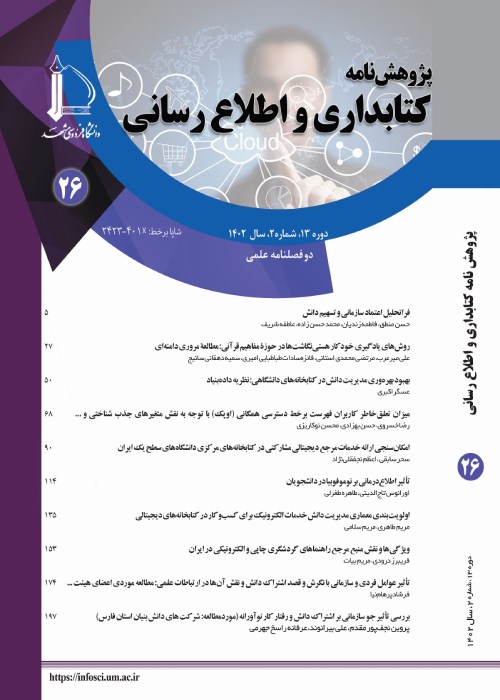Meta-Analysis of the Relationship between Organizational Trust and Knowledge Sharing
Knowledge sharing is one of the key processes of knowledge management, and its effective implementation plays a significant role in achieving the goals of knowledge management. Many factors affect the knowledge sharing of employees, one of the most important is the trust factor. Trust is one of the important and effective components in any model of organizational knowledge sharing. Based on this, in the present research, an attempt has been made to investigate the relationship between knowledge sharing and organizational trust with a comprehensive approach and using the meta-analysis method.
The current research is practical in terms of purpose, which has used the meta-analysis method to determine, collect, combine and summarize the study findings on the subject of the relationship between the variables of knowledge sharing and organizational trust. In this research, first by using the keywords of trust (organizational trust, institutional trust) and those of knowledge sharing (knowledge sharing, knowledge transfer) in databases such as the Iranian Research Institute for Information Science and Technology (IranDoc), Tehran University Central Library, MagIran, Jihad Site (SID), and foreign databases such as Emerald, ProQuest, Elsevier and Springer were searched and all articles and theses that investigated the relationship between trust and knowledge sharing were collected. The number of samples reached 72 studies after applying the inclusion and exclusion criteria and using the purposeful sampling method. The scale of effect size was correlation coefficients and statistical analysis was done with comprehensive meta-analysis software (CMA2).
The meta-analysis results showed that the effect size in the random effects model for the institutional trust component is equal to .468, for the individual (cognitive- affective) trust component is equal to .428, and for the organizational trust structure is equal to .446, which according to Cohen's criterion (1988) all three obtained combined effect sizes are medium to high effect sizes. Also, examining the role of moderating variables showed that the variable of the "research location" (English and Persian) is one of the factors of the heterogeneity of the effect size. The effect size in the Persian research was equal to .482, which is more than the effect size in English research, which was equal to .401. The Q statistic (between groups) for the variable of "research location" was also obtained at a favorable significance level, which indicated its moderating role on the observed effect size. Also, regarding the role of the "publication type" variable, the significance level for the Q statistic (between groups) was higher than the desired level (p>.05). Therefore, it was concluded that the" type of publication" as a moderating variable has no effect on the observed effect. In other words, although the effect size of .448 obtained in the reviewed articles is more than the effect size of theses, it is not statistically significant and acceptable.
The results of this research showed that the relationship between organizational trust and its components (individual, institutional trust) and knowledge sharing is effective and in terms of the size of their effect, it is medium (upwards). In explaining the results, it can be said that organizational trust plays an important role in knowledge sharing, and a high level of trust in relationships among organizational members makes them more willing to share knowledge with each other and the majority of studies reviewed in this research have reported the trust as an important factor affecting knowledge sharing. Therefore, paying attention to organizational trust and its influencing dimensions on the intention and behavior of knowledge sharing can greatly help to improve the performance of the organization's knowledge management system. Based on this, it is necessary for managers of organizations to improve the knowledge sharing behavior of employees by creating a favorable organizational atmosphere. In this regard, by adopting encouraging and supportive policies, justice and fair treatment, promoting group learning, and forming informal and friendly groups, the institutional and individual trust of employees can be improved.
- حق عضویت دریافتی صرف حمایت از نشریات عضو و نگهداری، تکمیل و توسعه مگیران میشود.
- پرداخت حق اشتراک و دانلود مقالات اجازه بازنشر آن در سایر رسانههای چاپی و دیجیتال را به کاربر نمیدهد.




